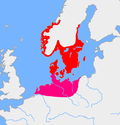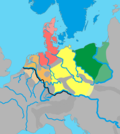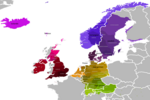All Indo-European verbs that passed into Germanic as functioning verbs were strong, apart from the small group of irregular verbs discussed below. The... 29 KB (2,932 words) - 16:56, 19 April 2024 |
the Germanic languages, a strong verb is a verb that marks its past tense by means of changes to the stem vowel. The majority of the remaining verbs form... 125 KB (12,200 words) - 18:20, 7 April 2024 |
In the Germanic languages, weak verbs are by far the largest group of verbs, and are therefore often regarded as the norm (the regular verbs). They are... 60 KB (5,117 words) - 07:44, 14 March 2024 |
 | verbs had the voiceless alternants. Alternation between the present and past of strong verbs remained common and was not levelled in Proto-Germanic,... 130 KB (12,128 words) - 09:47, 26 March 2024 |
conjugation of Germanic strong verbs such as sing/sang/sung. While Germanic umlaut has had important consequences for all modern Germanic languages, its... 52 KB (5,283 words) - 23:04, 25 March 2024 |
a limited number of verbs, or if it requires the specification of more than one principal part (as with the German strong verbs), views may differ as... 18 KB (2,546 words) - 07:22, 26 March 2024 |
 | with OHG lembir The development of Class III weak verbs into a relic class consisting of four verbs (*sagjan "to say", *hugjan "to think", *habjan "to... 10 KB (1,100 words) - 09:07, 9 April 2024 |
verbs Germanic verbs Hebrew verb conjugation Hungarian verbs Ilokano verbs Irish verbs Italian verbs Japanese godan and ichidan verbs Japanese verb conjugations... 20 KB (2,582 words) - 11:31, 2 April 2024 |
strong verbs to become weak. As German is a Germanic language, the German verb can be understood historically as a development of the Germanic verb. The... 44 KB (5,751 words) - 10:05, 14 December 2023 |
most primary verbs were simple root verbs. Some imperfectives with the ye-suffix survived into Proto-Germanic, as did one nasal-infix verb (*standaną "to... 82 KB (7,771 words) - 13:34, 25 March 2024 |
inflection of strong verbs, they are known as preterite-present verbs. As in other Indo-European languages, a verb in Proto-Germanic could have a preverb... 59 KB (6,256 words) - 20:49, 13 April 2024 |
Gothic verbs have the most complex conjugation of any attested Germanic language. Most categories reconstructed for the Proto-Germanic verb system are... 48 KB (1,898 words) - 22:42, 10 August 2023 |
Old English grammar (redirect from Old English verbs) only four verbs. By the Old English period, new class I weak verbs had stopped being produced, but so many had been coined in Proto-Germanic that they... 84 KB (8,354 words) - 23:15, 13 April 2024 |
advice. Modal verbs generally accompany the base (infinitive) form of another verb having semantic content. In English, the modal verbs commonly used... 13 KB (1,487 words) - 00:51, 26 April 2024 |
 | Verbs constitute one of the main parts of speech (word classes) in the English language. Like other types of words in the language, English verbs are... 37 KB (5,127 words) - 09:57, 15 February 2024 |
Grammatischer Wechsel (category Germanic languages) primary underived verbs and so any derived verbs lacked perfect forms altogether. The latter verbs formed the base of the Germanic weak verbs and did not inherit... 12 KB (1,316 words) - 09:12, 25 November 2023 |
weak verbs. As the weak past participle was formed with the Proto-Indo-European suffix *-tos, the assimilation could have occurred in all verbs with stems... 11 KB (1,404 words) - 23:22, 16 October 2023 |
 | Indo-European languages (redirect from Indo-Germanic) Latin verb ferre is irregular, and not a good representative of a normal thematic verb. In most Romance languages such as Portuguese, other verbs now mean... 111 KB (10,129 words) - 10:03, 26 April 2024 |
Indo-European ablaut (category Germanic languages) in the English verbs ride, rode, ridden, or fly, flew, flown. For simply learning English grammar, it is enough to note that these verbs are irregular... 28 KB (3,501 words) - 17:05, 1 April 2024 |
The Germanic substrate hypothesis attempts to explain the purportedly distinctive nature of the Germanic languages within the context of the Indo-European... 14 KB (1,707 words) - 13:34, 8 April 2024 |
Look up weak verb in Wiktionary, the free dictionary. Weak verb may refer to: Germanic weak verb, verbs in Germanic languages that form their preterites... 554 bytes (115 words) - 07:21, 12 January 2017 |
German grammar (section Verbs) singular present-tense verbs in English, most German verbs employ four different suffixes for the conjugation of present-tense verbs, namely -e for the first-person... 8 KB (693 words) - 21:03, 14 April 2024 |
Other tenses may use compound verbs in which the conjugated form of usually bod (to be) precedes the subject and other verb-nouns come after the subject... 7 KB (951 words) - 06:54, 23 April 2024 |




